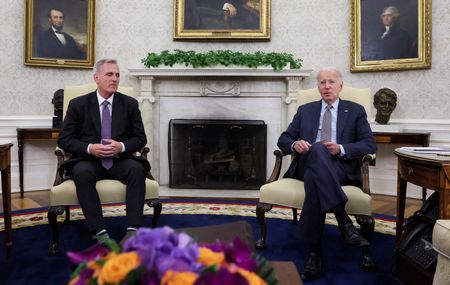 1
1 1
1
By David Lawder
WASHINGTON (Reuters) – U.S. House of Representatives Speaker Kevin McCarthy on Sunday lauded the debt ceiling deal he negotiated with Democratic President Joe Biden, but a prominent House conservative warned that McCarthy has “credibility issues” that may prompt some Republicans to seek his ouster as the top Republican in Congress.
Representative Ken Buck, a member of the far-right House Freedom Caucus, said the deal had failed to deliver the deeper spending cuts that McCarthy had promised his party when he ran for speaker in January.
The debt ceiling deal keeps fiscal 2024 spending flat at this year’s levels, allowing a 1% increase for fiscal 2025. The non-partisan Congressional Budget Office estimates that the deal will cut deficits by about $1.5 trillion over a decade from its current-law baseline forecast.
House Republicans in late April passed a bill demanding $4.8 trillion deficit reduction over 10 years in exchange for a debt ceiling hike, drawing Biden into negotiations that led to the deal’s Senate approval on Thursday.
Asked whether the Freedom Caucus would seek a vote to oust McCarthy in response to the deal, Buck told CNN’s State of the Union program: “I don’t know if the motion to vacate is going to happen right away. I do know that Speaker McCarthy has credibility issues.”
To win the speakership in a fractious election process in January, McCarthy agreed to rule changes that allow just one member to force a vote to oust him, making him unusually vulnerable to hardline Republican conservatives.
Other Republicans rushed to McCarthy’s defense a day after Biden signed into law the legislation that suspends the debt ceiling until Jan. 1, 2025, averting what would have been a disastrous U.S. payments default that was expected on Monday.
“Speaker McCarthy’s position is absolutely safe,” U.S. Representative Garret Graves, a Louisiana Republican who helped negotiate the debt ceiling deal, told CBS’ “Face the Nation”.
McCarthy told Fox News Channel’s “Sunday Morning Futures” that the deal marks a rare reduction in non-defense discretionary spending, prevents the hiring of more Internal Revenue Service agents next year and increases funding for defense and veterans.
“It’s not perfect but it is a beginning of turning the ship” on spending, he said. “Now we’ve got to do the rest of the job.”
DEAL PASSES IN DIVIDED CONGRESS
Buck said that McCarthy promised Republicans that he would cut spending levels to fiscal 2022 levels, not the higher 2023 levels agreed in the deal, making the deal a loss the party.
To regain conservatives’ trust, Buck added that McCarthy’s future actions will need to “involve spending responsibly” and stop relying on the votes of Democrats as he did to pass the debt ceiling suspension.
The deal was approved by 149 House Republicans and 165 Democrats, strong majorities of both parties. Roughly half the 76 Republican no votes were from the ultra-conservative Freedom Caucus, while 46 Democrats, mostly progressives, opposed the deal, saying it enforced stringent work requirements on poor families who receive food assistance or monetary aid and others who face obstacles to employment.
They also criticized provisions that could lead to ending the student debt payment pause for younger people, and the streamlining of approvals for fossil fuel industry projects opposed by environmentalists, two key constituencies for Democrats.
On Friday, Fitch Ratings it would keep the U.S. top tier credit rating on “negative watch” until the third quarter due to concerns over repeated brinkmanship over the debt ceiling, along with rising debt and deficits.
Asked if she was concerned about a ratings downgrade, White House budget director Shalanda Young told CNN that the Biden administration does not control Fitch’s assessment process, but has warned about the potential costs of debt ceiling brinkmanship.
“It’s bad for the country. It’s bad for the global economy,” added Young, who helped negotiate the deal. (This story has been refiled to fix the order of words in the headline)
(Reporting by David Lawder; Editing by Aurora Ellis)